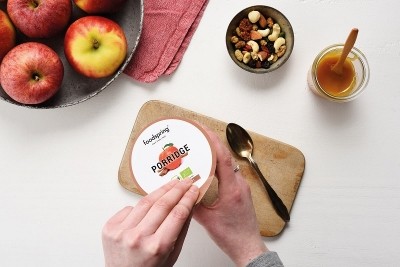Soya ‘still king’ in plant-based space as report hails its health and sustainability benefits

Soya has been part of the human diet for centuries but in recent years consumption in Europe has taken off, particularly in the form of dairy alternatives and plant-based meat alternatives.
According to Kantar data, for example, nearly a quarter of UK households (7 million households) have, among them, spent £216 million in the past year on soya dairy alternatives alone. Soya drinks, which are the most popular way of consuming soya, have seen a 16% increase this year compared to the same period last year.
Unilever, too, has this just week filed four international patents for new minced meat analogues and vegetarian burgers with textured soy protein the main component.
More use of the ingredient has led to its health and sustainability credentials to come under increased public scrutiny. For example, a survey of 200 dietitians, nutritionists and other health professionals, conducted in March 2021 by MyNutriWeb, one of the main providers of nutrition education to health professionals in the UK, revealed that nearly 80% were detecting a growing interest in soya from the patients and people that they advise.
“Around 4 in 5 (78%) professionals working in nutrition say they’ve been asked questions about the impact of soya on health. Professionals say there is some confusion among the public about whether soya has a positive or negative impact on health status, ranging from cancer to menopause and even muscle building,” it said.
Meanwhile, the food industry is busy exploring new alternative proteins such as pea and seitan – and even the realms of microorganism fermentation and cellular agriculture -- to use as ingredients in the quickly accelerating meat-free category.
‘Misplaced concerns’
However, the new Soya Nutrition, Health & Sustainability report from MyNutriWeb claims to “overwhelmingly counter misplaced concerns” concerning soya. The report, which was reviewed by a panel of experts on nutrition, health and sustainability, “brings to light the overwhelming evidence that soya foods and drinks are not only safe but have the potential to improve health outcomes, it said.
The report added that most (96%) of nutrition professionals themselves overwhelmingly believe that soya food and drinks contribute to good nutrition and health, with three quarters (76%) saying it is a source of good protein, equivalent to animal protein.
Dr Mark Messina of Loma Linda University, one of the experts who reviewed the report, and who is also the lead author of a separate analysis of 400 soya studies, said there was overwhelming evidence that soya as part of a healthy diet can provide health benefits. “Soya provides high-quality protein and healthy fat. What’s more, independent of its nutrient content, there is intriguing evidence that moderate amounts of soya may reduce risk of several chronic diseases include coronary heart disease, osteoporosis, and certain forms of cancer.”
Kate Roberts, a registered dietitian, expert in plant-based diets, and specialist in paediatrics and allergy, and who advises her patients to consume soya foods from the age of six months as part of a healthy balanced diet: said: “I would like it to be more widely known that soya is safe and beneficial in children’s and adults’ diets. It’s amazing how rumours and worries still persist. I want to get the message out there to other healthcare professionals and parents that it’s good to include soya in your children’s diets.”
The report includes new guidance for food and health professionals which states:
- Men’s testosterone levels are NOT affected by soya isoflavones
- Two 2021 papers prove that soya is as effective at building muscle as whey products and animal proteins
- Soya can help control hot flushes in menopausal women
- Soya foods and drinks are safe for breast cancer patients and do not increase risk
- Soya does not disrupt the endocrine (hormone) system concludes the most comprehensive ever technical review on soya and health in Critical Reviews in Food Science and Nutrition [online March 2021].
- Most health and nutrition professionals (79%) are witnessing a growing interest in soya from the patients and people that they advise
Soy can play a ‘big role’ in sustainable farming
It has been claimed that the global trade and production of soy negatively impacts biodiversity and generates significant amounts of greenhouse gases by, for example, the conversion of native land into agricultural land. But MyNutriWeb’s managing director Tanya Haffner told FoodNavigator that the ingredient can ‘play a big role in sustainable farming’ and that concern should only be apportioned to the soya grown for animal feed, which is predominantly sourced from the Amazon.
“Amongst beans, pulses, lentils and plant proteins, soya is king. It is nutritionally superior and is a very versatile ingredient for the food and catering sector,” we were told. “It is now grown in Europe successfully and some farmers have recently piloted its growth successfully in the UK. Growing soya in the UK can play a big role in sustainable farming and food manufacturing in the UK. It’s a big opportunity that our renewed food system should embrace.”
Dr Mark Driscoll, founder and director of the think-tank Tasting the Future, said: “Soya plays a really important role as part of a healthy nutritious and sustainable balanced diet in the context of some of these planetary health emergencies we confront whether it’s biodiversity loss, climate change.”
The sustainability expert, who provided analysis that soya production for humans is vastly more sustainable than meat production and the production of certain other dairy alternatives, added: “Society supported by governments really need to focus on that shift towards more plant-based diets. At the moment we do not have a level playing field in terms of regulations – a lot can be done by governments to influence and shape those food environments.”















